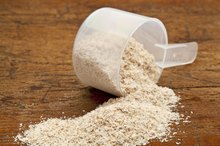Licorice Root for Constipation
Constipation is a common gastric problem affecting almost everyone at some point. Abnormal stool frequency, straining during bowel movements and a feeling of incomplete evacuation are hallmarks of the unwelcome condition. Causes include insufficient intake of water, a low-fiber diet, medications and lack of exercise. You can use herbal medicines such as licorice root to promote your bowel activity. However, use licorice root or other natural remedies with caution and only under the supervision of your doctor.
If you are experiencing serious medical symptoms, seek emergency treatment immediately.
About Licorice
Licorice is a perennial with large tuberous roots. This plant is native to Europe but has escaped cultivation in America. The root of the licorice plant is approved for the treatment of peptic ulcers, canker sores, eczema, dyspepsia and upper respiratory infections, according to the University of Maryland Medical Center 2. The high flavonoid content is responsible for most of its healthful properties. Licorice root is sold as teas, powders, capsules and tincture.
- Licorice is a perennial with large tuberous roots.
- The high flavonoid content is responsible for most of its healthful properties.
Licorice Root and Constipation
Herbs That Stimulate Peristaltic Action
Learn More
Licorice root can be used in chronic constipation because it promotes peristalsis and aids in assimilation, according to James F. Balch, M.D., co-author of "Prescription for Nutritional Healing." Peristalsis is the process that forces feces in the large intestine through the gastric system 1. Take 50 mg of a standardized root extract at a time after two meals per day for a few days to achieve the desired effects.
Natural Laxatives
Psyllium laxatives — which come from a shrub-like herb called Plantago ovata — help reduce constipation, moving waste through the intestines. Glucomannan, another type of natural laxative, may be helpful for constipation. It comes from the root of the konjac plant. Other fibrous herbs such as flaxseed, fenugreek and barley also make valuable remedies for constipation. Most of these herbs are said to work because they add fiber and cause the intestinal muscles to contract, moving the stool along.
- Psyllium laxatives — which come from a shrub-like herb called Plantago ovata — help reduce constipation, moving waste through the intestines.
- Most of these herbs are said to work because they add fiber and cause the intestinal muscles to contract, moving the stool along.
Precautions
Herbs to Help Bowel Movements
Learn More
Always seek the advice of your physician before starting any new treatment. Avoid using licorice products for more than six consecutive weeks unless your doctor is supervising because it may cause fluid retention and high blood pressure. The UMMC warns that people should not use licorice with heart, liver and kidney diseases. Licorice root can act as a blood thinner and may increase the risk of bleeding when taken with anticoagulant drugs such as aspirin and warfarin.
- Always seek the advice of your physician before starting any new treatment.
- Avoid using licorice products for more than six consecutive weeks unless your doctor is supervising because it may cause fluid retention and high blood pressure.
Related Articles
References
- "Prescription for Nutritional Healing"; James F. Balch, M.D. and Phyllis A. Balch, C.N.C.; 1997
- "University of Maryland Medical Center"; Licorice; Steven D. Ehrlich, NMD; March 2010
- NIH National Center for Complementary and Integrative Health. Licorice root. Updated December 1, 2016.
- Raveendra KR, Jayachandra, Srinivasa V, et al. An extract of glycyrrhiza glabra (GutGard)alleviates symptoms of functional dyspepsia: a randomized, double-blind, placebo-controlled study. Evidence-Based Complementary and Alternative Medicine. 2012;2012:1-9. doi:10.1155/2012/216970
- Messier C, Epifano F, Genovese S, Grenier D. Licorice and its potential beneficial effects in common oro-dental diseases. Oral Dis. 2012;18(1):32-39. doi:10.1111/j.1601-0825.2011.01842.x
- Shi Q, Hou Y, Yang Y, Bai G. Protective effects of glycyrrhizin against β2-adrenergic receptor agonist-induced receptor internalization and cell apoptosis. Biol. Pharm. Bull. 2011;34(5):609-617. doi:10.1248/bpb.34.609
- Tsao S, Yin M. Antioxidative and antiinflammatory activities of asiatic acid, glycyrrhizic Acid, and oleanolic acid in human bronchial epithelial cells. J. Agric. Food Chem. 2015;63(12):3196-3204.
- Zhao H, Zhang X, Chen X, et al. Isoliquiritigenin, a flavonoid from licorice, blocks M2 macrophage polarization in colitis-associated tumorigenesis through downregulating PGE2 and IL-6. Toxicology and Applied Pharmacology. 2014;279(3):311-321. doi:10.1016/j.taap.2014.07.001
- Nahidi F, Zare E, Mojab F, Alavi-Majd H. Effects of licorice on relief and recurrence of menopausal hot flashes. Iranian Journal of Pharmaceutical Research: IJPR. 2012;11(2):541-8.
- Hajiaghamohammadi AA, Zargar A, Oveisi S, Samimi R, Reisian S. To evaluate of the effect of adding licorice to the standard treatment regimen of helicobacter pylori. The Brazilian Journal of Infectious Diseases. 2016;20(6):534-538. doi: 10.1016/j.bjid.2016.07.015
- Irani M, Sarmadi M, Bernard F, Ebrahimi Pour GH, Shaker Bazarnov H. Leaves antimicrobial activity of Glycyrrhiza glabra L. Iranian Journal of Pharmaceutical Research: IJPR. 2010;9(4):425-8.
- Penn State Hershey Milton S. Hershey Medical Center. Licorice.
- Omar HR, Komarova I, El-Ghonemi M, et al. Licorice abuse: time to send a warning message. Therapeutic Advances in Endocrinology. 2012;3(4):125-138. doi:10.1177/2042018812454322
- Räikkönen K, Martikainen S, Pesonen A, et al. Maternal licorice consumption during pregnancy and pubertal, cognitive, and psychiatric outcomes in children. Am J Epidemiol. 2017;185(5):317-328. doi:10.1093/aje/kww172
- Consumer Reports. Food and drug interactions you need to know about. Updated November 4, 2018.
- Winchester Hospital. Library. Updated April 11, 2011.
- Consumer Reports. How to choose supplements wisely. Updated October 30, 2019.
- FDA. Black licorice: Trick or treat? Updated November 6, 2017.
Writer Bio
Henry Pitot has been writing since 1992. His work has appeared in leading peer-reviewed journals, including "The Lancet" and Cancer Research Online. He is certified in oncology and hematology by the American Board of Internal Medicine. He received his Doctor of Medicine from University of Wisconsin in 1986.









